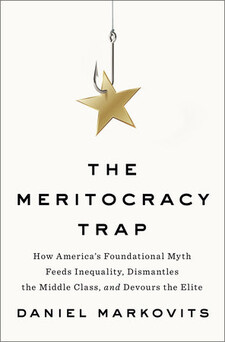Professor Markovits on the Meritocracy Trap
Meritocracy — the idea that a person’s hard work and abilities determine one’s rewards in society — sits at the very center of the American ideal. But meritocracy is a failure, writes Guido Calabresi Professor of Law Daniel Markovits ’00 in his new book The Meritocracy Trap: How America’s Foundational Myth Feeds Inequality, Dismantles the Middle Class, and Devours the Elite (Penguin Press).

Meritocracy fails because it both oppresses the middle class and hurts the elite, he writes. Most of all, the differences in the way the elite educate their children affects how hugely disadvantaged children in lower income brackets are compared to their richer counterparts. Middle-class children cannot afford the expense of an elite education and face discrimination in the labor market without one. Rich children enter a grueling and competitive education regimen from a young age, resulting in record high rates of depression and anxiety in young adults. Once adults in the labor force, they suffer burnout from the pace and pressures of an elite workplace.
These divisions, Markovits says, sow discord that has led to our divided political climate. As the current system hastens inequality, “it drives the middle class to resent the establishment and seduce the elite to cling to the corrupt prerogatives of caste.”
To address the meritocracy trap, Markovits advocates for reforms to both education and work.

But reforming the current system will not come easily or quickly, Markovits explains.
“The meritocracy trap was constructed over generations and will take generations to dismantle,” he writes. Such changes, if enacted together and working over time, could help shore up the middle class and reduce societal divisions. “A more equal social and economic order would therefore make everyone — both the rich and the rest — better off,” Markovits says.
At the Law School, Markovits is Founding Director of the Center for the Study of Private Law. He works in the philosophical foundations of private law, moral and political philosophy, and behavioral economics.


